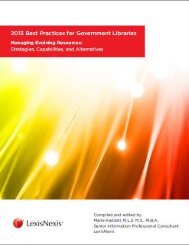2012 Best Practices for Government Libraries
2012 Best Practices for Government Libraries
2012 Best Practices for Government Libraries
Create successful ePaper yourself
Turn your PDF publications into a flip-book with our unique Google optimized e-Paper software.
20<br />
BEST PRACTICES <strong>2012</strong><br />
Librarians Wanted to Help Create Innovative and Interactive Solutions <strong>for</strong><br />
Smart <strong>Government</strong><br />
By Ken Wheaton, Systems Librarian, Alaska State Court Law Library; <strong>2012</strong> President SLA<br />
PNW, and Art Murray, CEO of Applied Knowledge Sciences, Co-director of the Enterprise of<br />
the Future Program at the George Washington University Institute <strong>for</strong> Knowledge and<br />
Innovation<br />
In our recent series on the Knowledge Librarian in KMWorld we talked about why smart<br />
cities need smart libraries. We envisioned the smart city having a “brain” which acts as a<br />
“central clearinghouse <strong>for</strong> connecting people, creating social cohesion and enabling<br />
sustained economic growth through knowledge.” 1 The smart city springs from the<br />
massive shift in the world’s economy from agriculture to industry to in<strong>for</strong>mation and now,<br />
to a knowledge-based economy.<br />
This presents a tremendous opportunity <strong>for</strong> libraries and librarians to make the transition<br />
from in<strong>for</strong>mation providers to knowledge brokers. This is not unlike what the World Bank<br />
experienced a few years back when its Director at the time, James Wolfensohn,<br />
announced that the Bank’s greatest value as an institution was not so much the large<br />
sums of money it had, but rather its even greater treasure trove of knowledge. Similarly,<br />
libraries can undergo a trans<strong>for</strong>mation not seen since the turn of the last century when<br />
Andrew Carnegie introduced the “open stacks” design enabling people to browse and<br />
discover books on their own.<br />
One place to begin this trans<strong>for</strong>mation is in government. Most of today’s government<br />
organizations are artifacts of an age in which government was basically an arbitrator of<br />
transactions, hence the heavy emphasis on documents and records which can be found in<br />
every agency and more recently in data.gov. While providing improved access to all of<br />
this data by ordinary citizens is certainly applauded, we haven’t even scratched the<br />
surface regarding how to use that data in a beneficial way. For that we need knowledge,<br />
which brings us back to the smart library and the smart librarian.<br />
To illustrate, consider that a key aspect of what differentiates knowledge from in<strong>for</strong>mation<br />
is the ability to “connect the dots” in ways that reduce redundant or conflicting ef<strong>for</strong>ts<br />
aimed at achieving the same goal. Nowhere is this problem more prevalent than in<br />
government.<br />
For example, 2007 Census data show that the United States has a total of 39,044 units of<br />
local general purpose government, which includes 19,492 separate municipal government<br />
organizations. Most of these units are still based on 19 th -century governance laws and tax<br />
systems.<br />
The vast majority of local governments claim to be under-resourced. Yet all too often,<br />
their own self-interest prevents them from looking beyond their boundaries <strong>for</strong> resources<br />
that can be shared. We’re not talking about financial resources, but rather knowledge<br />
resources. Out of those 39,044 units, how much knowledge-sharing is actually going on?<br />
If one organization solves a problem or comes up with a better way of doing something,<br />
how many of the other 39,043 will have access to that knowledge? Or more likely, how<br />
many of them will end up going through the same process of trial-and-error or<br />
“reinventing the wheel” while attempting to achieve the same result?



